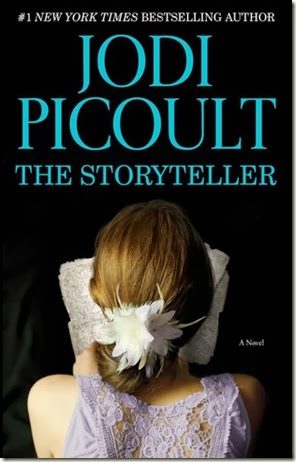The Storyteller
by Jodi Picoult
Summary: Sage Singer befriends an old man who's particularly beloved in her community. Josef Weber is everyone's favorite retired teacher and Little League coach. They strike up a friendship at the bakery where Sage works. One day he asks Sage for a favor: to kill him. Shocked, Sage refuses…and then he confesses his darkest secret - he deserves to die, because he was a Nazi SS guard. Complicating the matter? Sage's grandmother is a Holocaust survivor.
What do you do when evil lives next door? Can someone who's committed a truly heinous act ever atone for it with subsequent good behavior? Should you offer forgiveness to someone if you aren't the party who was wronged? And most of all - if Sage even considers his request - is it murder, or justice?
Genre: Historical Fiction
Add to Goodreads
Source: I borrowed a hardcover from a friend.
Review:
The Storyteller was absolutely wonderful. World War II and the Holocaust interest me quite a bit, but I’ve never read a Jodi Picoult book and always filed her under authors I probably wouldn’t be interested in for whatever reason. I was hesitant to pick this up, but I ended up reading it because I knew I needed to return it to my friend.
The beginning of the book was slow and full of bread references, but Sage’s character was interesting and the members of her grief group were entertaining. I kept reading, but I felt like the beginning was not promising. I like and understand the process of making bread, but it was too much. Even the prologue, which dealt with a character named Ania in a small village, had bread baking. Fortunately, I kept reading and it paid off.
Sage was of Jewish descent. She befriended an old man who went to her grief group and also showed up at the bakery where she worked. He was a nice man, but after becoming fast friends, he confessed to being a Nazi. This moment was where the story picked up. Sage’s grandmother was a Holocaust survivor and of course, the news shocked her. She struggled with what to do. She eventually contacted the agency responsible for putting away former Nazi’s still hiding out in the States.
The Storyteller had multiple points of views/stories. Sage’s point of view was the most obvious. There was the story of Ania in a small Polish village that was ravaged by an upior, which is the Polish vampire. Josef, the old man and confessed Nazi, told his story. And Leo, the agent working on the case of whether Josef was really a Nazi, had his point of view. Sage’s grandmother also had sections where she told her survival story. All of the stories connected and intertwined. I loved the way the book was laid out and how it all sort of came together. I got a lot of different styles and stories and I enjoyed the effect.
I really enjoyed figuring out the validity of the confessed Nazi’s story and hearing Sage’s grandmother’s survival story. I even thoroughly loved Leo’s point of view and how he looked at he world.
The weakest part of the story was Sage. I had so many issues with her. I got that she was self conscious due to having scars on her face from an accident. She didn’t love herself at all and blamed herself for everything. And while there was redemption and she did grow, I didn’t like her character. Her issues seemed exaggerated and over the top, even though I did understand that she was dealing with grief and guilt and feeling ugly. Perhaps I just dislike heroines who have so many issues, but I think her rapid transformation into a functioning human being was what made her ultimately unbelievable to me. I know hearing stories about what other people go through gives us all perspective, but to imagine that her grandmother’s story suddenly makes her a functioning person just wasn’t right to me. I felt like it almost trivialized the whole thing.
Also, even though she was of Jewish descent and she was horrified, like many of us are, by Nazis, I felt like immediately calling the FBI after Josef’s confession was unbelievable to me. I know there’s an agency that works on those cases and I don’t necessarily think it was overreaction by any means, but it just wasn’t a reaction that I bought, if that makes sense. I had a little trouble with that whole lead in.
I’m not sure how I feel about the ending. I suppose that’s a discussion for another day with people who have read the book so I don’t spoil anything. I go back and forth with whether or not I liked it.
Overall, The Storyteller was a wonderful story about forgiveness and evil, dealing with issues that matter, especially identity. It had wonderful life lessons and it was done in an intelligent way. I don’t understand why there was so much about Sage that took away from the intelligent design of the story or the importance of it. I would, however, highly recommend the book. The issues I had with Sage mattered less and less as the story progressed and I became invested in the entire story as a whole. It’s definitely a good read.
Labels: Review
